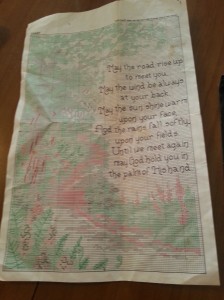In the summer of 2007, a quiet community in Lancaster County, PA was shocked by a triple murder: three family members brutally stabbed in their home. Their college-age daughter survived because she was home earlier than expected.
In the summer of 2007, I was on my honeymoon, starting married life in Illinois. If I heard anything about this tragedy, I don’t remember, nor did I ever think I’d live in the same county where it took place.
I learned about these events through a book, written by a man with connections to the crime. (Disclaimer: I received a free copy of the book from the authors in exchange for my review.)
 Refuse to Drown by Tim Kreider and Shawn Smucker is the story of a father who lost his son. Because his son committed the crime.
Refuse to Drown by Tim Kreider and Shawn Smucker is the story of a father who lost his son. Because his son committed the crime.
Kreider’s son Alec was 16 when the murders occurred. He was best friends with the teenage son who died. For a month the murders went unsolved, and the Kreider family worried about the effect on Alec’s emotional and mental health. Then one day, the unthinkable happened: Alec confessed to the crime while receiving psychological treatment at a nearby mental health center.
Refuse to Drown is Kreider’s account of the month before the confession and the year that followed. In it he recounts his inner turmoil of making the unimaginable decision to turn in his son to the police, knowing that it would change all of their lives forever.
While much attention and sympathy is directed toward the families of crime victims–and rightly so–much less is given to the families of those who commit the crimes. Refuse to Drown is a powerful reminder that suffering occurs on both sides of a tragedy.
Kreider is courageous to go public with his story, even after six years have passed, because he opens himself to criticism for sharing it all. I’ve already seen comments to that effect. I don’t know the man, but his words on the pages don’t sound like a man out to hurt or cause pain. He’s deeply troubled by his son’s actions and has wrestled with his own actions as a father, wondering if he could have somehow prevented the act.
He speaks, and writes, his story today in an effort to draw other troubled teens out of their darkness and into the light. Kreider founded a non-profit aimed at helping people discover that they are not alone in their trials and struggles.
Refuse to Drown isn’t an easy book to read. The first few chapters read like a crime drama, full of suspense as you realize the killer is living in the house with the Kreider family but isn’t showing any clues that he did it. Then, when Alec confesses, the agony of his father’s decision is heartbreakingly honest. He doesn’t deny the temptation to protect his child and cover up the truth. Nor does he sugarcoat the emotional, physical and spiritual toll the tragedy took on his family.
He makes some poignant observations. Here are a few that stick with me.
Before the confession, these words:
“I am your father,” I told Alec many times in those days. “I love you and will always be here for you, no matter what.”
No matter what.
Have you ever thought about those words, what they actually mean? Sometimes we say those words and have no idea what the “what” might someday be. (42)
Later, after his son’s sentencing, Kreider describes what it’s like to visit him in prison. And he says this:
Sometimes I think, When I’m an old man, coming here to visit Alec, this is going to be a long walk. … I wonder who will visit Alec when his mother and I are gone. (185)
And a closing thought:
We shouldn’t be so hard on ourselves when we experience difficult moments, even if those moments turn into months or years. But what do we do with those moments? Do we give up and let them win, or do we refuse to drown and fight back to the surface?
Tim Kreider is a man who knows difficult moments and has come through them. His story is encouraging and full of hope for those in the midst of troubling times.
The book is available here and you can find updates on the story, as well as interviews with the author, on the Refuse to Drown Facebook page.



















